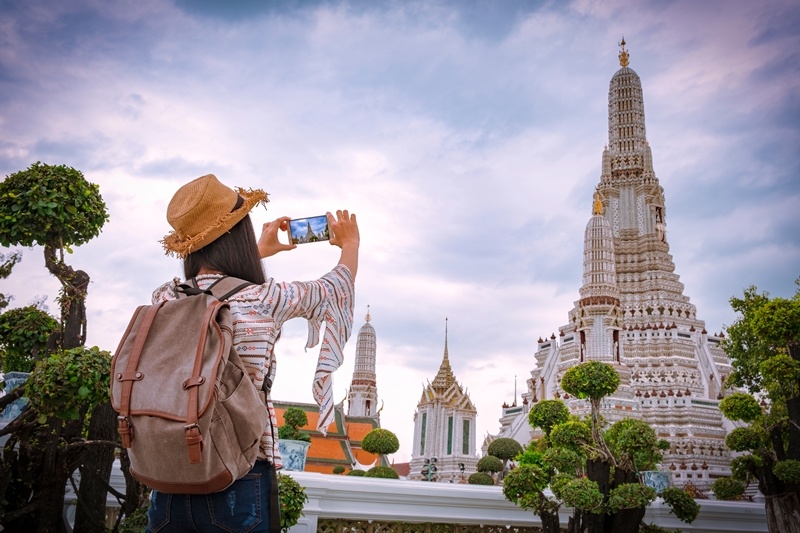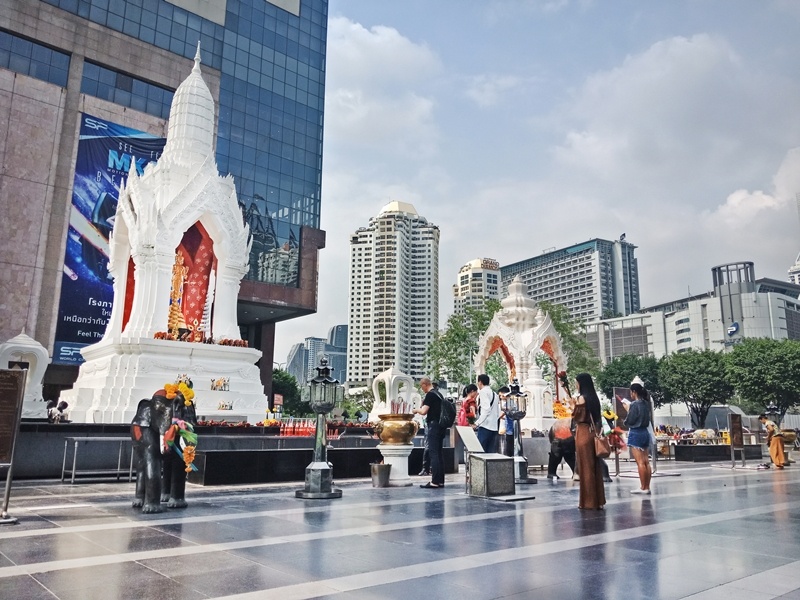It’s always a good idea to know some new phrases when you travel to a new destination. If you want to avoid being targeted as a tourist, the delivery of those phrases is just as important. Here are some phrases that will help you sound less of a foreign tourist and more like someone who lives here in Thailand - get these phrases down and you’ll be sounding much more like a local and if you’re lucky, get local prices when you’re bargaining on the street. Not only that - ‘lessening’ your foreignness could increase the likeliness of you getting to your destination especially if you’re traveling by taxi, as the driver will understand exactly where you’re wanting to go from the get go.

1. Sawat dee
Let’s start with this greeting phase that you’ll hear morning, noon and night. A general rule of thumb here is if you are male, you add Khrup (rhymes with cup - starting with a high pitch and going higher) to the end of a sentence to sound polite and if you’re a lady, you add ‘Kha’ (sounds like ‘car’ said by an Australian - with the pitch starting high and falling down low) for politeness.
John: Sawat Dee Khrup
Jane: Sawat Dee Kha
No need to emphasize too much on ‘R’ in Khrup. Only TV hosts do that for show. Normal Thais might even just go with ‘Kup’
2. Pen Yang Ngai Bâng? (How are you)
Sabai Dee mai’ works as well … but if you really want to sound like a local ‘Pen Yang Ngai Bang’ would do a better job. This phrase has the feel of a casual ‘How are you going’? In Australian English, or ‘What’s up?’ in American English.
3. Gin Khao Reu Yang? (Have you eaten anything?)
Why would people ask such a thing? Asking if someone has eaten yet is a very common way to greet people in this part of the world. As a land where food can be found on every corner and every time of the day, this is not a strange question. It means that we care. If you visit a Thai friend’s house, it is common that they will ask you this question, if not by them directly, certainly by their parents. If your answer is ‘No’ - ‘Yang Mai Dai Gin (Khrup / Kha)? They will almost certainly feed you.
4. An Ni (Ra Kha) Tao Rai? (How much does this cost)
This one needs a hand gesture to make it more effective. Point at an object that you want to buy or want to know the price of, and say ‘An ni tao rai?’ Don’t forget Khrup at the end if you are a man, and Kha if you are a woman’.
In Thai, just like in English, we have counter or ‘measure’ words like ‘loaves’ of bread, or a ‘herd’ of goats. The generic counter word for things in general is ‘an’, so in this sentence ‘An ni’ means ‘This one [counter word] - How much? The word ‘RaKha’ means ‘price’, so given the context it’s an optional word.
Other measure words include ‘pon’ for oranges, things in pairs like shoes and socks are counted as ‘koo’, and pieces of things like cake are counted in ‘chin’ as their unit. … but Aun ni can be used in general. Have a play around with different measure words while you’re in Thailand - see how many you can find.

5. Pai (I want to go to …)
When you need to tell a driver to go to Centara Ladprao, to say it like a local just say ‘Bpai Centara Ladprao’ and that’s that. No need to complicate things by adding more words. The word ‘Bpai’ meaning to go is sufficient, followed by the place you’re going.
Make sure to speak slow if the place you go to has some English name in it, as the ‘Tinglish’ way to pronounce English words might render the English words almost incomprehensible to a native English speaker not accustomed to ‘Tinglish’, and likewise if you pronounce a word in English like you would back home, even if they knew that word in writing, it might be very hard for them to understand you. Better yet, check with someone how is it is pronounced locally and then try your hand at the local pronunciation.
If you want to go to Central, you may want to say it Sen Tun (rhymes with bun), and not Central (In Thai, final L and R almost always become ‘N’, and clustered consonants like ‘tr’ in ‘Central’ usually end up having the 2nd letter in the cluster eliminated.
6. Khob Khun (Thank You)
Need we say more about the importance of this phase? This simple phrase goes a long way. So, make sure you say it right and sounds nice and genuine.
Male: Khob Khun Khrup
Female: Khob Khun Kha
7. Mai Aow ( I don’t want …)
You might find this one of the most useful phrases as you travel throughout Thailand - whether it’s people trying to sell you things, asking you to go with them or when you’re in a restaurant placing an order, saying what you want and don’t want is easy.
If you WANT something, use the word ‘Aow’ followed by what you want. Aow Nam Khaeng - I would like ice (notice how you don’t need to say the word for ‘I’).
If you DON’T WANT something, just put the word for ‘no’ or ‘negative’- ‘mai’, in front: Mai Aow Nam Khaeng - I don’t want Ice
Some other useful ‘don’t wants’ include:
Don’t want sugar - Mai aow namtan
Don’t want spicy - Mai aow phed
If you just want to say ‘I don’t want it’ - Mai Aow Khrup / Kha works as well, but it also requires a hand gesture or head shakes to go with it. Remember - Khrup and Kha will always make whatever you’re saying sound much more polite - and is the norm when Thai strangers speak with each other.
If someone hands you a plastic bag or plastic straw, you just say ‘Mai Aow Khrup / Kha’ with your hand handling those plastic back to them.

8. Khor I would like
Being able to request something in a local language helps when traveling. The word ‘Khor’ can be used not only asking for food, but for making any request.
May I have a late check out? - Khor Late Check-Out duay dai mai Kha? (Could I request for late check out please) I want more sugar please - Khor Namtarn duay dai mai Kha? I want more chilli - Khor Phrik duai dai mai Kha?
Or if you want to sound a bit more demanding
I want more fish sauce - Khor Nam Pla noi Kha?
I want more bread- Khor Khanom Bpang duay Kha?
9. Mai Pen Rai (It’s ok / It doesn’t matter)
To refuse an offer officially or in a more polite manner, you say ‘Mai Bpen Rai’
Staff: Rup Khao Perm Mai Kha? (Would you like to have some more rice?) - (Direct translation is ‘Would you like to add more rice ?)
John: Mai Pen Rai Khrup
Jane: Mai Aow Kha
10. Jer Gun Khraw Na (See you later)
Party is over and it’s time for you to say goodbye to your local friends. Saying ‘see you later’ is like a promise that one doesn’t need to commit to but it sounds nice for you and those you left behind.
Jer Gun Khraw Na - See you next time (no specific time)
So when you are leaving the staff at your hotel who have now become your friends, you say to them ‘Jer Gun Kraw Na Kha / Khrup’ … or if you have become very close and built a very strong bond you can just skip Kha / Khrup and say ‘Jer Gun Kraw Na [name of staff]’
